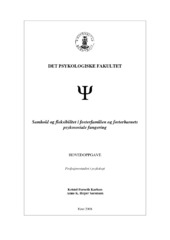Samhold og fleksibilitet i fosterfamilien og fosterbarnets psykososiale fungering
Master thesis
Permanent lenke
https://hdl.handle.net/1956/3176Utgivelsesdato
2008-11-21Metadata
Vis full innførselSamlinger
- Faculty of Psychology [527]
Sammendrag
The relationship between cohesion and flexibility in the foster family and the foster child's psychosocial functioning was examined. Psychosocial functioning was conceptualized as internalized and externalized problems, and social skills. The sample consisted of 90 foster children aged 3 to 12, whose foster parents volunteered to participate in a PMTO-programme. Psychosocial functioning was assessed using Child Behavior Checklist (CBCL), Teacher's Report Form (TRF), Caregiver- Teacher's Report Form (C-TRF), and teacher- and parent versions of Social Skills Rating System (SSRS). Cohesion and flexibility were measured with Family Adaptability and Cohesion Evaluation Scales (FACES III). On average the foster children scored above the norms for internalized and externalized problems. Better social skills were related to fewer total, internalized and externalized problems. There was no association between cohesion and flexibility in the foster family and the child's internalized and externalized problems, however a higher degree of cohesion was related to better social skills. The results indicate that foster family cohesion may be an important factor in the social functioning for the foster children. Sammenhengen mellom samhold og fleksibilitet i fosterfamilien og fosterbarnets psykososiale fungering ble undersøkt. Psykososial fungering ble definert som internaliserte og eksternaliserte vansker, samt sosiale ferdigheter. Utvalget bestod av 90 fosterbarn fra tre til tolv år, hvis fosterforeldre hadde meldt seg frivillig til å delta på PMTO-kurs. Psykososial fungering ble kartlagt med spørreskjemaene Child Behavior Checklist (CBCL), Teacher's Report Form (TRF), Caregiver- Teacher's Report Form (C-TRF), og lærer- og foreldreversjonen av Social Skills Rating System (SSRS). Samhold og fleksibilitet i fosterfamilien ble målt med Family Adaptability and Cohesion Evaluation Scales (FACES III). I gjennomsnitt skåret fosterbarna i denne studien høyere enn normene på internaliserte og eksternaliserte vansker. Bedre sosiale ferdigheter hos fosterbarnet var forbundet med færre totale, internaliserte og eksternaliserte vansker. Det ble ikke funnet noen sammenheng mellom samhold og fleksibilitet i fosterfamilien og barnets vansker. Familiesamhold, men ikke fleksibilitet, var relatert til bedre sosiale ferdigheter hos fosterbarnet. Resultatene indikerer at samhold i fosterfamilien kan være en betydningsfull faktor for fosterbarnas sosiale fungering.
Utgiver
The University of BergenOpphavsrett
Copyright the author. All rights reservedThe author
